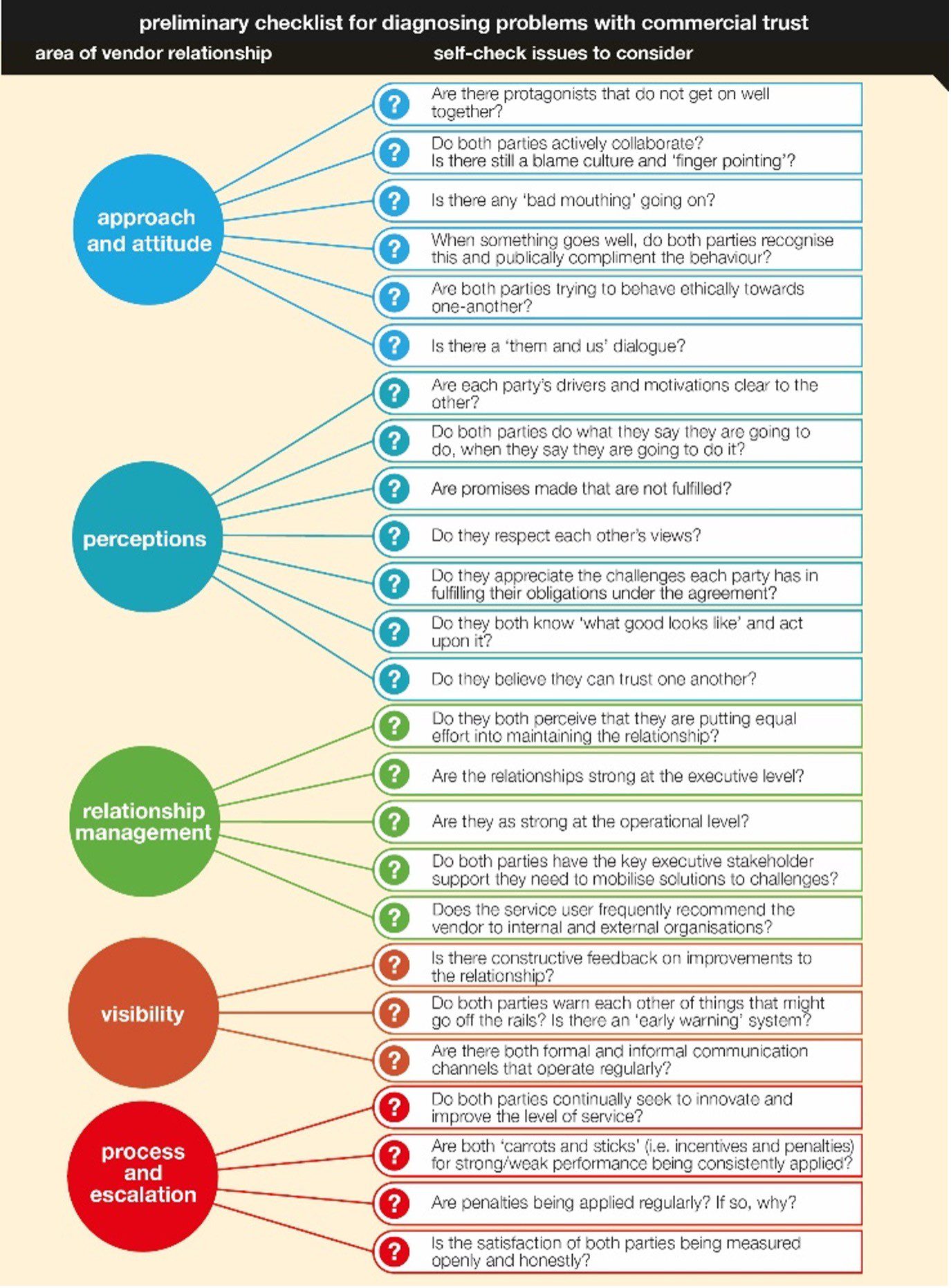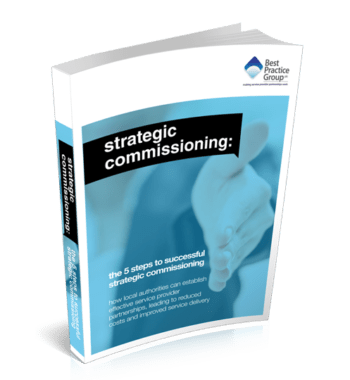 A collaborative partnership in complex projects can only exist where a fair and balanced spread of interests and value is achieved between the parties. In other words, good partnerships exist in an environment where mutual interests are not only sought but prioritised throughout.
A collaborative partnership in complex projects can only exist where a fair and balanced spread of interests and value is achieved between the parties. In other words, good partnerships exist in an environment where mutual interests are not only sought but prioritised throughout.
Unfortunately, some strategic partnerships exist in an imbalanced state where one or more of the parties are weighting things too far in their own favour to get all they can get out of the relationship with too little regard for their partner’s interests.
It is, therefore, vital to be able to identify when this is happening earlier rather than later (either to you or by your own team) and to find ways of realigning the priorities of the relationship into interest equilibrium.
Your complex project – It started out so well
Early market engagement and a thoroughly diligent procurement process should provide you with a considerable amount of insight into the sort of organisation your strategic supplier runs. It goes without saying that they would have put their best foot forward to get your business; potentially demonstrating collaborative behaviours through their bidding team’s interactions with you, great technical expertise through identifying bottlenecks in your current operation and suggestions of solutions, alongside empathy with the business outcomes you were trying to achieve.
It’s important to see through the veneer of these potential pleasantries and early-stage effort in order to seek out the true nature of your supplier.
Their interests can be pulled out of alignment with yours at any point in your relationship; therefore, an appreciation for why this might happen is key:
-
- Short-term financial pressures at home. Most organisations – public and private – are required to report periodically on earnings. Therefore, at certain times of the year, your strategic supplier will be under internal pressure to show results. Our own experience is that this often impacts on their decision-making and priorities. Other short-term pressures may include shareholder expectations, performance-based incentive schemes and staff bonuses.
- Long-term evolutionary pressures. Changes in technological, political and economic environments may increase the pressure on your partner to prioritise its own interests over yours. All of these, under the right circumstances, can, of course, also offer opportunities for realignment.
- Competing long-term and short-term interests. Every strategic supplier relationship is a complex mix of competing interests and priorities for both client and supplier, a balancing act between what needs to be evidenced today versus what needs to be completed tomorrow. This is an ever-shifting landscape which can be difficult to predict or plan for, but recognition of what those priorities and interests are likely to be is a good first step.
- Poor communication. Too little time spent with too few stakeholders, or in developing relationships with supplier-side counterparts and involving them early in the conversation and the decision-making process can lead to misunderstandings and lost commercial trust. Create a forum for improved communication, speak clearly and frankly to minimise ambiguity.
Your supplier’s ‘Expert Responsibilities’ – the importance of an implied ‘Duty to Warn’
While it may at first seem fruitless to assume that you could possibly predict your strategic supplier’s priority motivators, you do have some legal help in this. If your supplier represents itself as an ‘expert’ in its field, then legal precedence determines that it is now required to live up to certain ‘expert responsibilities’. Key among these is your expert supplier’s ‘duty to warn’.
Essentially, as soon as your supplier is determined, through its own assertions, to be an ‘expert’, an implied knowledge gap is established with your supplier often now legally responsible for a number of things:
-
- It has a duty to warn you about what its advice covers and what it does not cover.
- This duty extends to warning you about what its service/solution covers and what it does not cover.
- It has a duty to warn you of the consequential impact on the project of the advice it does not cover.
- It also has a duty to warn you of the consequential impact on the project of the service/solution it does not cover.
- This duty to warn exists from the moment it represents itself as an expert (often this will be pre-contractual) and usually extends throughout the entire duration of your relationship.
- This duty is often not dependent on any written contractual terms and usually cannot be excluded in practical terms in the written contract.
For more information on this subject take a look through What is a supplier’s Duty to Warn?
Sanity check your complex project supplier’s behaviours
Complex project strategic supplier relationships require a considerable amount of management to (a) drive really good, innovative and practical behaviours so that both client and supplier achieve their original desired business outcomes, and (b) minimise the risk of misaligned interests, or identify them should they occur.
The identification of issues may be possible through hints in your supplier’s behaviour, but just as important as recognising the signs is how you react to them. Some may well be indicative of a problem whereas others may not, and the wrong response could impact on commercial trust that we all know is hard won and easily lost.
The graphic below shows a checklist of questions to consider in order to diagnose the issues that may occur between you and your strategic supplier. It’s a good starting point to determining whether your supplier’s behaviours indicate problems on the horizon.
25 questions to see what’s caused the issues

The realignment process
With potential issues identified, how you go about handling them will say a lot about you as an organisation and could well have a significant impact on the trajectory of your relationship.
Firstly, it’s important to remember that finger pointing is the least desirable way to go. The end goal of a realignment process should be the development of a repaired relationship that’s been put back on track to achieve the outcomes everyone has agreed. Blame and finger pointing only serves to drive a wedge between parties and should only be used as part of a coordinated and multifaceted approach to restitution should the relationship be in difficulty.
Realignment is the process you go through to recalibrate a relationship that is in difficulty and there’s a tried and tested seven-stage course of action to follow.
-
- Remind everyone of ‘what good looks like’. Even if you diligently assessed the outcome you wished to achieve, got buy-in from all relevant stakeholders to create a clear and calculated end goal and were fastidious in your communication of it to your strategic partner, checking that they understood your expectations of them, things can still become misaligned.
- Misunderstandings happen. But more importantly things change over time – your understanding of your supplier’s capacities and capabilities, the environment, technologies and even tastes can change. So, use this as an excuse to run your analysis of ‘what good looks like’ again, bring it up to the present and go through the process of sharing it with your supplier with the appropriate attention to clarity and detail. It’s important for everyone to be clear on the fundamentals.
- Know your contract, intimately. It’s important that you do everything by the book. If you have a misalignment in either your expectations or approach to resolution and it escalates into something deserving of a legal process, then your commitment to the clauses in your contract which pertain to the escalation process may make all the difference to your case. Hopefully, you’re not there yet, this is just the realignment process, but an intimate knowledge of your contract is vital, even at these earliest stages of a dispute that can so quickly escalate beyond friendly dialogue.
- If it can’t be evidenced then should it be pursued? Where any material issue needs to be discussed with your strategic supplier, your chances of drawing them back into alignment are significantly increased if you have a full, catalogued, chronological trail of events to present as evidence of the point you’re making. This reduces the subjectivity and increases objectivity. A complaint without evidence is simply finger pointing and a strategic partner’s response to this is likely to be negative, driving the whole conversation in the wrong direction, away from a resolution and towards conflict.
- Book time with your supplier. It’s often best to approach this from the top down. The higher up the ‘food chain’ you go, the less likely they are to be aware of the issue you wish to bring to their attention and the more likely they are to have the power to do something about it. Provide your supplier with an agenda for the meeting, you’re not looking to surprise them, ambush them or win an pyrrhic victory. You’re looking to correct a course change – they are your collaborative partner so show you’re there to work with them. This also provides the supplier with time to prepare their side of the discussion as you want this to be resolved quickly and fairly. Allowing it to drag out can only make matters worse.
- Be the bigger person. Stay true to your goal – repair and move forward. Stay positive, maintain a constructive attitude no matter what comes your way from the other side and evidence that you are there for the right reasons – to realign, to build your commercial trust and to move your collaborative partnership forward.
- Control the narrative. Clearly articulate the outcomes you wish to achieve as a result of your meeting, present a detailed record of evidence to support your reason for calling the meeting, determine a course of action post-meeting to move the parties towards realignment and ensure that the reason why the actions you agree together were necessary is fully understood.
How we can help
If you believe that there is an interests imbalance in your strategic supplier relationship, or if you wish to determine the best way back from a challenging dispute with your supplier you may wish to speak with a specialist in this area.
BPG has been working with clients in strategic relationships for over twenty years, getting complex projects back on track quickly and bringing strained client-supplier relationships into a better place. To schedule a conversation about your specific challenges, contact us on 0845 345 0130 or at advice@bestpracticegroup.com

